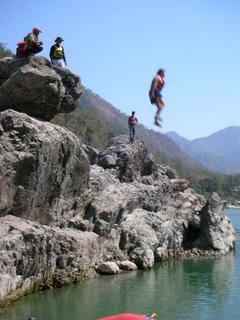T's Top Twenty Travel Tips
 Throughout my travels, I’ve learned a few handy tricks of the traveling trade. Some of them you may have heard before, but there may be a few newbies. As the first leg of my extended global journey ends, I leave you with my top twenty tips. Some of them apply more to budget travel; others are targeted at international travel. You may only find them worth as much as you paid for them. In any event, here they are in no particular order:
Throughout my travels, I’ve learned a few handy tricks of the traveling trade. Some of them you may have heard before, but there may be a few newbies. As the first leg of my extended global journey ends, I leave you with my top twenty tips. Some of them apply more to budget travel; others are targeted at international travel. You may only find them worth as much as you paid for them. In any event, here they are in no particular order:1. Order vegetarian meals on flights as you usually get a fresher meal, the meat doesn’t rot in your gut while you’re sitting for hours on end, and the taste of rubber chicken is usually not as good as a hot carrot.
2. Carry a pen with you on international flights. You will need it to fill out customs and immigration forms. You can sometimes beat the crowds if you have your forms completed before you land.
3. Bring an all-in-one universal electricity converter and adaptor with a removable fuse in case a surge causes your adaptor to short circuit. That said, make sure you have a backup fuse.
4. Before booking accommodations at your destination, check travel threads online to read other traveler’s reviews. They are usually more honest and direct than the tour books and guides.
5. If you use a guide book like Lonely Planet or Frommers, rely on it more for getting around and points of interest. Usually featured accommodations are overstated and overly touristy by the time the book has been in print for a year. The internet is a better source for finding the latest hot spots or up and coming digs.
6. If you’re in a country where taxis do not use meters, negotiate the fare before you get in. If you’re arriving at an airport and need a taxi, look for a taxi stand before you leave the terminal. Many countries now have taxi stands that charge fixed rates based on mileage. This avoids haggling and overcharging of unsuspecting visitors. Also, check for airport shuttle buses to and from the central part of town. They are usually less expensive and can be just as efficient.
7. Never get in a cab with people other than the driver if you don’t know them. Some cars present themselves as taxis, but are really just taking you for a ride far enough to snag your wallet and luggage. Along the same vein, if your luggage fits in the backseat with you, avoid putting it in the trunk. This way you are less of a captive audience as your luggage is not held hostage. Additionally, sometimes drivers try to charge a “luggage fee” if it is placed in the trunk (e.g. Malaysia).
8. Always carry a pack of baby wipes in your backpack or handbag. Keeps your options open.
9. When arriving at a new hotel or hostel, ask the front desk for a map. Most places have maps of the surrounding area readily available. The maps are usually in large print and have the most recent information. At the same time, ask for a hotel business card. This will come in handy if you do not speak the local language and get lost. Show it to a shopkeeper or a taxi driver and they can get you back to your home away from home.
10. Research your destination before you get there. This one is more for independent travelers and is quite obvious, but more time put in up front means less time while you're on the road, freeing you to be in the moment. Plus, these days the best discount room offers are usually web specials. (Note: If traveling to SE Asia, don’t prebook your inter-country flights from the US (unless you are on a really tight schedule). They can be double or triple the price of buying a ticket locally just a day or two before your flight.)
11. Carry small bills of foreign currency at all times. You don’t want to flash big cash if you are in unfamiliar territory. Plus if you are bargaining over a $10 item and pull out a $100 bill, it’s hard to rely on the “poor me” argument. Instead, keep three sets of money on your person. One set is your backup US dollars for emergency situations or bail. A second set of small bills in foreign currency should be in your right pocket. And finally, in your left pocket (or money belt) should be a third set of foreign currency in various denominations.
12. Before purchasing local wares or handicrafts, ask locals around town how much such and such might “go for”. Many times they will tell you a local price. Then when you walk into the shop, you know your price point. You may still end up paying a slight “tourist tax” of sorts, but at least it’s not the “rake you over the coals and leave you for dead tax”. Just be prepared to walk away. Remind yourself, you didn’t have it before you walked in so you’ll probably be alright leaving without it. Plus, I estimate most travel purchases to be at least 50% impulse buying. Ever buy something abroad, get it home, and say to yourself, “what was I thinking?” Yeah, I thought so, me too.
13. Continuing on the bargaining theme, if you are negotiating over $1 or $2, think about who may benefit from the small difference more. It usually means a lot more to the vendor. Sometimes it’s ok not to get the “best deal ever”.
14. Pack small enough so that you can carry-on the plane. For four and a half months, I traveled with four shirts, two pairs of pants, one pair of shoes, one pair of sandals and one pullover. That’s it. And it was more than I needed. You can add in a new shirt along the way if necessary. Wal-Mart is taking over the world so you can find it in a country near you.
15. Don’t ask me why, but clean clothes pack thinner than dirty clothes. I don’t know if it’s a matter of physics or chemistry relating to dirt molecules, but my clean clothes always packed more easily than the same clothes when they were dirty (which was most of the time).
16. Carry a bottle of water with you at all times.
17. Carry at least 2 extra passport photos with you. If you want to get a visa for an unscheduled country abroad, you’ll need the photos. And if you lose your passport, you’ll also need them. Just don’t keep them with your passport!
18. Check US government immigration website in the early stages of planning your trip. It is a one stop shop for travel advisories/warnings and visa requirements of other nations. You may need to get started on obtaining multiple visas months before your trip. If you don’t live in a major city, you will either have to use a visa service (usually a $25-$100 surcharge) or mail it to an embassy or consulate yourself. Depending on the embassy, the process can take anywhere from days to weeks.
19. Use an ATM card where feasible as banks usually give the best exchange rates. Traveler’s Cheques are virtually obsolete (much like the typewriter). Exchange cash inside a bank if possible, again they have the best rates. When you first arrive in a country, look for an ATM before you exit the terminal. If there isn’t one, then change $100 into the foreign currency for transportation into the city and incidentals. You can change more money when you get to town.
20. Learn about six or seven key words of the native language at your destination. After your smile, this is the largest currency you carry. Knowing how to say “Please”, “Thank you”, “OK”, “Hello”, “Goodbye” and “bless you” (in case someone sneezes) are essential. It usually evokes a surprised reaction from the recipient and you may even get a smile. It also helps break down barriers, erasing the “arrogant” westerner reputation.
21. Bonus Tip: Stay curious and enjoy the ride!


<< Home